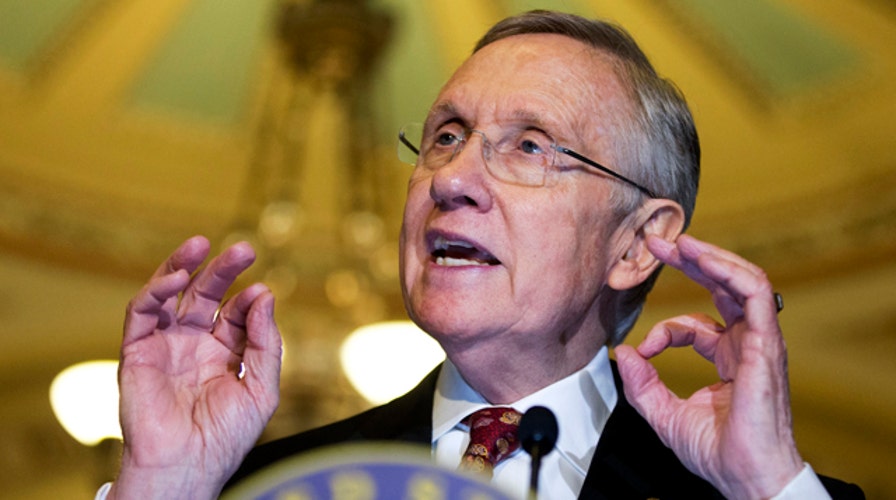Senate Democrats vote to change filibuster rules
Reaction from Fox News contributor Juan Williams
Penny-wise, pound foolish. That’s one way to describe Harry Reid’s outrageous decision to upend the filibuster rules in the Senate.
Jettisoning nearly a century of convention may make it easier to ram through appointments to certain federal agencies and to the D.C. Court of Appeals, but ramped-up hostilities in the Senate will almost certainly smother important items on Obama’s agenda, such as immigration reform.
Whatever the calculus, the rules change looks to be costly to both parties, and to the country.
[pullquote]
What this limp recovery emphatically does not need is a heavier regulatory hand, and that’s what Reid’s move delivers. That, and further roadblocks to popular measures like fixing our dysfunctional immigration and tax systems.
Consider the need to raise the debt ceiling. Senate Majority leader Harry Reid may imagine that Republicans are still chastened by the fall-out from the government shutdown earlier this fall.
GOP opposition to pushing through a new budget and to raising the debt ceiling, and their foolhardy demands that the president repeal his signature health care plan torched their approval ratings. But for the disastrous roll-out of ObamaCare, Republicans would still be in the doghouse.
Undoubtedly the GOP will approach upcoming negotiations with caution, or at least that was the expectation.
However, Minority Leader Mitch McConnell and others like John McCain sounded genuinely furious about Reid’s “nuclear option” maneuver; consequently collaboration may be even harder to come by.
This is not progress.
What will the change in rules mean to Americans?
It means a beefed up regulatory capability for one of the most anti-business White Houses in the country’s history.
For starters, President Obama will now pack the D.C. Court of Appeals with judges likely to sympathize with the EPA, the Consumer Financial Protection Bureau and National Labor Relations Board – agencies which have been in the forefront of regulations damaging to business, and to hiring.
Congress has not moved forward on much of the president’s to-do list, like levying a carbon tax, imposing card-check and raising the minimum wage, because such measures are generally unpopular with a country wary of the heavy hand of government.
As a result, some agencies have taken it upon themselves to push rules – like those from the EPA that effectively prohibit construction of new coal-fired generating plants -- that accomplish similar goals without having to secure the approval of Congress.
They have met resistance, though, in the form of lawsuits and procedural challenges, which have tempered the activist White House.
For instance, because he faced resistance to pro-union candidates selected to join the NLRB, President Obama made three so-called “recess” appointments to that board, even though the Senate was not formally adjourned. Business groups sued and won, with the D.C. Court of Appeals (and two others) determining that the appointments were unconstitutional.
Consequently, hundreds of decisions from the NLRB were tossed or put on hold, applying brakes to a slew of pro-labor rulings.
Thanks to Reid, we will see more of Obama’s green agenda go unchallenged, less push-back to Dodd-Frank and greater support for union organizing.
With many of the country’s small businesses, in particular, still struggling through the aftermath of the financial crisis, and worried about higher costs and fees from ObamaCare, such changes will continue to suppress hiring.
The big picture is equally worrisome, and especially for President Obama.
Americans are unnerved by ObamaCare, which they increasingly see as too big and too intrusive. They doubt the president’s ability and, now, his credibility.
The supposed "legacy" bill – identified not only as the president’s creation but even branded by the press with his name -- could well turn out to be an albatross instead. (Alert to the danger, committed fan Nancy Pelosi has started calling it by it's formal name the "Affordable Care Act.")
Voters are not in the mood to embrace even more of Obama’s liberal programs.
This loss of support, coupled with an obstructionist House and now more hostile Senate minority, will make it tougher for him to sell even popular measures.
A majority of the country favors immigration reform; most believe the current situation is unsustainable and damaging. Bipartisan talks on a possible deal have been promising, but agreement is not easy.
Thanks to Harry Reid, it just got a whole lot tougher. President Obama may rue the day when Harry Reid traded upending Senate filibuster rules for a real legacy accomplishment. He may wonder, was it worth it?

